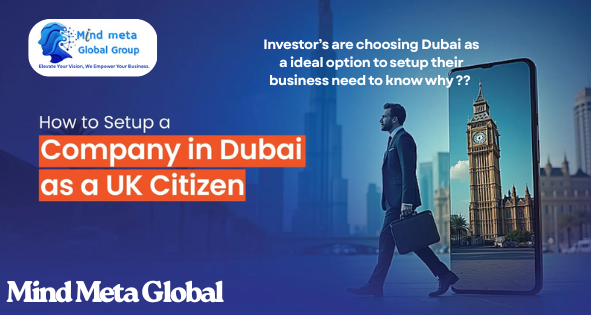
Why Choose Singapore for Company Formation?
ingapore and Dubai stand out as two of the world’s top business hubs. Both offer unique advantages for entrepreneurs and investors. Entrepreneurs and investors worldwide look toward these cities for company formation due to their strong economies, strategic locations, and business-friendly environments.
This article offers a fresh perspective if you are considering establishing your company’s headquarter in Singapore. While Singapore is known for its strong government support and startup-friendly policies, Dubai is quickly gaining ground as a global hub for entrepreneurs and investors.
In fact, Dubai was named the top city for foreign direct investment (FDI), attracting AED 52.3 billion ($14.24 billion) in FDI inflows, according to fDi Markets. It is a 33.2% increase as compared to 2023. This data proves that Dubai is becoming more attractive to foreign investors as compared to Singapore.
The reasons Dubai is slowly becoming a favorite location for most global investors are the various advantages it provides to businesses, such as favorable tax landscape powered with a growing economy. Even though Singapore ranks second for ease of doing business in the world, Dubai has become the top choice for investors and entrepreneurs due to better tax policies and higher potential for growth.
This guide will compare setup procedures, taxes, costs, and other important aspects to help you decide the best location for company formation: Singapore or Dubai.
Why Choose Singapore for Company Formation?
Singapore has earned its reputation as one of the easiest places in the world to start and run a business. The city-state is home to 71,639 business entities as per ACRA’s 2024 data. Let’s take a look at the various benefits business holders and investors enjoy in Singapore.
Business-Friendly Environment
Singapore ranks consistently high on global ease-of-doing-business indexes. The country offers a transparent legal system, efficient government services, and strong investor protection. Entrepreneurs find it simple to register and operate businesses with minimal bureaucracy.
Tax Advantages
There is no personal income tax up to S$ 20,000 for individuals. The highest income tax rate for an individual is 24% if the income exceeds S$ 1,000,000.
Singapore also offers a low corporate tax rate of 17%. However, companies can benefit from a partial tax exemption or a three-year start-up tax exemption if they qualify. Under the partial tax exemption, 75% of the first S$ 10,000 of chargeable income and 50% of the next S$ 190,000 are exempt from tax. For qualifying start-ups, 75% of the first S$ 100,000 and 50% of the next S$ 100,000 are exempt.
Additionally, companies enjoy no capital gains tax and no dividend tax, making company formation in Singapore attractive for international businesses.
Location Advantage for Expanding in The Asian Markets
Singapore serves as a key gateway to the ASEAN market, giving businesses access to over 660 million consumers across Southeast Asia as per ASEAN Stats Data Portal. The country has signed more than 100 Double Taxation Avoidance Agreements (DTAAs) with major economies. All these benefits make Singapore an attractive base for companies looking to expand in Asia.
Innovation Hub
Singapore’s strong government support for innovation has positioned it as a major hub for technology, fintech, and startups. In the Global Innovation Index 2024, Singapore ranked 4th globally. The country’s clear and strong intellectual property laws give businesses confidence to develop new products and ideas without fear of infringement. Over 4,000 tech startups operate in Singapore, backed by 400 venture capital firms and 220 government initiatives such as the Startup SG program . This environment supports business growth and innovation at every stage.
The government’s focus on promoting innovation has turned Singapore into a hub for technology and fintech startups. Strong intellectual property laws give businesses confidence that their ideas and products are protected.
Legal Structure
Entrepreneurs have multiple options when choosing a legal structure. The most popular type is the Private Limited Company (Pte Ltd), but Sole Proprietorship and Limited Liability Partnership (LLP) are also available. Foreigners are allowed 100% ownership, and only one resident director is needed for company registration in Singapore.
Why Choose Dubai for Company Formation?
Dubai has firmly positioned itself as a major global business hub. Due to its strategic location between Europe, Asia, and Africa, investors from across the world are drawn towards it. Dubai also has one of the busiest ports in the world—Jebel Ali Port. The city also boasts the second busiest airport in the world catering to over 900 million passengers in 2024.
Let’s look at some major advantages of starting a business in Dubai.
Tax Advantages
Dubai is a tax haven in literal terms with a 0% personal income tax rate. Recent changes introduced a 9% corporate tax rate for companies if their taxable income exceeds AED 375,000, which is still one of the lowest rates in the world. However, many qualifying Free Zone businesses still enjoy tax exemptions or zero corporate taxes. This makes company formation in Dubai a strong choice for tax-conscious investors. In terms of indirect taxes, Dubai only applies a 5% VAT (one of the lowest globally) on goods and services.
Free Zones and Mainland Options
Unlike other globally popular jurisdictions, Dubai offers two distinct options for company formation. You can either set up a business in Dubai Mainland, which allows you to trade directly within the UAE market and make you eligible for government contracts. Or, you can choose from 40 different Free Zone options that are tailored to different industries, providing unique benefits. Each zone has its own regulations and incentives, including 100% foreign ownership and full repatriation of profits.
For instance, DIFC is a primary global financial center in the MEASA region serving tech startups and financial services companies. The Free Zone also provides an ‘Innovation and AI Licence’ for businesses dealing in cryptocurrency, web3, and AI. On the other hand, JAFZA is more suitable for logistics, manufacturing, and ecommerce businesses.
Strategic Location with Access to the Middle East and North Africa (MENA)
Dubai’s location between Asia, Africa, and Europe gives businesses access to a massive market. The port of Jebel Ali is one of the busiest ports in the world, handling 15.5 million TEU in 2024. The port is situated at Jebel Ali Free Zone that is home to more than 10,500 companies from 120 countries across the world.
Furthermore, the UAE logistics market was valued at USD 54.5 billion in 2024 and is projected to grow at a CAGR of 5.7% to reach USD 95.2 billion by 2033. All these factors have made Dubai a preferred destination for logistics, trade, and regional headquarters.
Government Initiatives
The Dubai government has launched various initiatives to attract entrepreneurs, investors, and talent across industries. The Dubai Future Foundation program was introduced to shape the future of Dubai by focusing on innovation and collaboration between the public and private sectors.
Additionally, the UAE’s Golden Visa program offers long-term residency to global entrepreneurs and investors, so they can incorporate or invest in Dubai companies. The first six months of 2023 reported a 52% increase in the number of Golden Visas issued to foreign investors by the Dubai government, which proves that the initiative is working positively in attracting top international talent to the city.
Legal Structure
Dubai offers various business structures to cater to various business needs and requirements. Limited Liability Company (LLC) are the most popular structure among foreign investors. However, you must understand the legal requirements of setting up a company in Dubai Mainland as compared to starting a company in Dubai Free Zone. You may need a local sponsor in Mainland for some of the activities but get access to the local markets. Free Zones allow complete foreign ownership.
Businesses can choose based on their trading and operational needs.
Comparing Taxes in Singapore and Dubai
Both Singapore and Dubai are known for their business-friendly tax systems. However, there are important differences between taxes in Dubai vs Singapore that entrepreneurs should understand before deciding where to set up their company.
Corporate Tax Rates
Both Dubai and Singapore levy corporate tax on businesses registered in their jurisdictions. Singapore has a flat corporate tax rate of 17% on chargeable income. However, you can enjoy partial and startup tax exemptions which can reduce your tax liability.
Dubai used to offer a 0% federal corporate tax rate. However, lately it started imposing a 9% standard tax rate only if your taxable income exceeds US$1,02,096 (AED 375,000). For qualifying income, many Free Zones enjoy a 0% corporate tax rate, making Dubai the best place if you are looking to save taxes.
Other Tax Considerations
Both Dubai and Singapore have indirect taxes, namely Value Added Tax (VAT) and Goods and Services Tax (GST). The VAT rate in Dubai is 5% on many goods and services. On the other hand, the standard GST rate in Singapore is 7%. There are no capital gains taxes in either city. Singapore also imposes withholding tax (WHT), ranging from 10% to 24%. Dubai does not have any such WHT requirements.
Double Tax Treaties
Both Singapore and Dubai have an extensive network of double tax treaties. Dubai claims 193 DTAAs (Double Tax Avoidance Agreement) and BITs (Bilateral Investments Treaties). This allows exemption or reduction of taxes on investments and profits to avoid getting taxed in both jurisdictions. Singapore has 108 DTAs, Limited DTAs, and EOIA (Exchange of Information Agreements), allowing a more convenient and tax-free trading with many countries.
Since Dubai holds more double tax treaties, you have a better chance of saving taxes if you are willing to trade globally. However, you must ensure that your markets are covered in the tax treaties.
Costs of Company Formation in Singapore vs Dubai
When comparing Dubai company formation vs Singapore, it’s essential to understand the differences in setup costs. Both locations offer competitive options, but their specific costs vary significantly based on requirements.
Setup Costs
Singapore:
Establishing a company in Singapore involves several components:
- Government Fees: The Accounting and Corporate Regulatory Authority (ACRA) charges a non-refundable fee of USD 12 (S$15) for company name approval and USD 231 (S$300) for company registration, totaling USD 243 (S$315).
- Corporate Service Provider Fees: Foreign entrepreneurs often engage corporate service providers for assistance. These services include nominee director arrangements US $1,200-$3,074 (S$1,500–S$4,000/year), company secretary services US $385 – $1,200 (S$500–S$1,500/year), and provision of a registered office address US $231 – $769 (S$300–S$1,000/year). The initial setup costs, including these services, typically range from US $1,768 – $4,995 (S$2,300 to S$6,500).
- Visa Costs: There are various work visas available in Singapore based on your requirements. An Employment Pass costs US $80 (S$105) to apply and US $173 (S$225) for each visa. The price is the same for an EntrePass, that is available to entrepreneurs with an existing presence in Singapore.
Dubai:
Setting up a business in a Dubai Free Zone involves various costs:
- License Fees: Depending on the Free Zone and business activity, license fees can range from USD $3305 to USD $7500.
- Corporate Service Provider Fees: It is wise to engage a corporate service provider if you are a foreigner in Dubai. Dubai business setup companies usually do not charge a fee for setting up a company in Dubai. However, the fee is usually charged by corporate service providers for assisting you through the process, which can be complicated for foreigners as well as some locals. Any mistake could lead to delays or rejections. Also, consultancy service providers, like Mind Meta Global offer additional services, such as corporate tax registration and filing, accounting, bookkeeping and more. These services also come with a fee and it depends on which services you opt with forming your company in Dubai.
- Visa Costs: Investor and employee visas typically range from US $1130 to US $2050 per visa depending on your requirements, including medical tests and Emirates ID charges.
Comparison:
Singapore setup costs can range from US $ 1770 (S$ 2,300 = 1767.23$) to US $15,370 (S$ 20,000 = $15367.18), depending on your requirements and business objectives. Similarly, Dubai’s Free Zone offers multiple setup options, with costs varying widely, ranging from USD 3305 to USD 7500. What option you choose depends mainly on what type of business goals and objectives you have. More cost does not mean the option is not good if you have a high profit chance. So, consider all the factors before choosing a jurisdiction and do not pick one solely on the basis of costs.
Ongoing Operational Costs
Singapore:
- Office Rentals: Office rental rates in Singapore vary significantly by district. In the Central Business District (CBD), rental rates range from USD 8 (S$ 10) to USD 10 (S$ 12) per square foot per month. In Marina Bay, rates are slightly higher, averaging USD 10 (S$ 12) to USD 12 (S$ 14) per square foot per month. Renting an office in Singapore can cost you anywhere from USD 1537 (S$ 2,000) to USD 12910 (S$ 15,500) monthly.
- Utilities and Other Expenses: Utilities, internet, and other operational expenses can add approximately USD 385 (S$ 500) to USD 1537 (S$ 2,000) per month, depending on the office size and location.
Dubai:
- Office Rentals: In Dubai, office rental rates vary based on location. For instance, in prime areas like Business Bay or Downtown Dubai, office spaces can be more expensive, while locations further from the city center, like Jebel Ali or Al Quoz, offer more affordable options. For instance, a Flexi-desk in some Free Zones starts at US $1,562 (AED 5,000) per year, while dedicated offices can range from US $5,446 to US $13,615 (AED 20,000 to AED 50,000) annually.
- Operational Expenses: Free Zones in Dubai offer flexible packages, including virtual offices, which can lower operational costs. Additionally, businesses in Free Zones benefit from tax exemptions and simplified import-export procedures, reducing overall operational expenses.
Comparison:
Office rentals, utilities, and general operational expenses are generally higher in Singapore compared to Dubai. Dubai’s Free Zones offer flexible packages like virtual offices, which can lower operational costs.
Labour Costs
Singapore:
- Average Salaries: The average salary for a software engineer in Singapore is approximately S$ 70,000 per year.
- Other Costs: Employers are also responsible for Central Provident Fund (CPF) contributions, which can add approximately 17% to 20% of an employee’s salary.
Dubai:
- Average Salaries: The average salary for a software engineer in Dubai is around AED 180,000 per year.
- Other Costs: Employers in Dubai are required to provide health insurance and may also contribute to end-of-service benefits, which can add an additional 5% to 10% of an employee’s salary.
Comparison:
While Singapore offers a highly skilled workforce, Dubai’s lower average salaries and absence of personal income tax can result in cost savings for businesses.
Cost of Living Comparison
Singapore:
- Housing Costs: Singapore’s housing market is known for its high costs, with private residential rents averaging S$ 3,000 to S$ 6,000 per month, depending on location and property type.
- Transportation and Utilities: Public transportation is efficient and affordable, with monthly passes ranging from S$ 100 to S$ 150. Utilities can add approximately S$ 200 to S$ 300 per month.
Dubai:
- Housing Costs: Dubai’s housing market offers a range of options. While luxury living can be expensive, there are affordable options available. For instance, rents for one-bedroom apartments in areas like Jumeirah Village Circle or Dubai Silicon Oasis can range from AED 30,000 to AED 60,000 per year.
- Transportation and Utilities: Public transportation is available, with monthly passes ranging from AED 300 to AED 500. Utilities can add approximately AED 500 to AED 1,000 per month, depending on usage.
Comparison:
The cost of living in Dubai vs Singapore is an important factor. While Singapore’s cost of living is higher, Dubai offers a range of affordable living options, especially in areas further from the city center. This difference affects both personal and business expenses in the two cities.
Legal Framework and Regulations in Singapore and Dubai
Both Singapore and Dubai offer strong legal frameworks for businesses. However, their regulatory environments, licensing processes, and compliance obligations differ significantly depending on the company structure and industry.
Singapore
Singapore has a well-regulated, transparent legal system. Business registration is fast and can be completed within a few days. Companies must comply with the Accounting and Corporate Regulatory Authority (ACRA) requirements. Strong IP protection and strict anti-corruption laws provide a stable environment for businesses.
Dubai
Dubai offers a flexible legal framework, especially in the UAE Free Zones where companies enjoy simplified registration and licensing processes. Mainland businesses may require a local sponsor. However, in Free Zones foreigners enjoy 100% ownership with 100% repatriation of profits. Dubai’s commercial law and Free Zone regulations are continuously updated to attract foreign investors.
Ease of Doing Business
Singapore ranks higher than Dubai in global ease-of-doing-business reports. However, Dubai is rapidly closing the gap through ongoing reforms and investor-friendly policies. On top of that, Dubai offers 0% individual income tax and 0% corporate tax on qualifying activities, increasing profits significantly that can be reinvested for business growth and expansion.
What are the Most Popular Business Sectors in Dubai and Singapore?
Dubai and Singapore have strong economies with fast-growing sectors like finance, technology, tourism, and healthcare. Entrepreneurs and investors have a wide range of profitable business opportunities in both jurisdictions.
Singapore
Singapore stands as a global hub for sectors such as fintech, logistics, manufacturing, biotechnology, and finance, attracting both startups and multinational corporations.
- Fintech: In 2025, Singapore’s fintech market is valued at approximately S$ 56.21 billion, making it a leading financial technology center in Asia.
- Logistics: The logistics sector reached USD 44.23 billion in 2024 and is projected to grow at a CAGR of 5.2%.
- Biotechnology: The biotechnology sector is expected to grow at an 8% annual growth rate. The number of biotech companies is projected to increase from 52 to 84 by 2032.
- Finance: Singapore’s financial sector expanded by 7% year-on-year in the first quarter of 2024, with the asset management industry reaching S$ 5.26 trillion. The city-state continues to lead Southeast Asia in green and sustainability-linked loans, totaling SGD 30.4 billion in 2023.
These sectors make Singapore a preferred destination for tech startups and multinational corporations establishing regional offices.
Dubai
Dubai excels in industries such as real estate, tourism, trade, logistics, and technology.
- Real Estate: In Q1 2025, Dubai’s residential sales surpassed AED 120 billion, marking an 18% increase compared to Q1 2024. The market has seen a 75% surge in average property prices since February 2021.
- Tourism: Dubai welcomed 18.72 million overnight visitors in 2024, reflecting more than 9% growth as compared to 2023.
- Trade: The exporting community in Dubai remains optimistic, with a composite Business Confidence Index (BCI) score of 124.2 points in Q2 2024, up from 122.1 in Q1 2024.
- Logistics: The UAE’s logistics market generated S$ 223.03 billion in revenue in 2024 and is expected to reach S$ 317.53 billion by 2030, growing at a CAGR of 6.1%.
- Technology: Dubai is home to over 2,300 technology companies, including global giants like Meta, Microsoft, and Amazon. The UAE’s tech industry is projected to grow by S$ 4.99 billion in 2025, with an annual growth rate of 6.24%.
The Dubai 2040 Urban Master Plan aims to enhance infrastructure, green spaces, and mixed-use developments. These developments will potentially increase the real estate demand and also boost tourism.
Conclusion
Choosing between Singapore vs Dubai depends on your business goals, industry, budget, and long-term plans. Singapore offers a highly regulated, innovation-driven environment ideal for tech and finance sectors. Dubai provides attractive tax advantages, lower operational costs, and strategic access to emerging markets.
Singapore is an ideal choice if you want to dominate the Southeast Asian market. However, Dubai offers better access to global markets, with more tax treaties to avoid double taxation. Setting up a business in Dubai is more budget-friendly and has significant tax benefits than Singapore.
However, you must still pursue professional guidance before choosing a particular jurisdiction. Here’s where we come in.
Working with Mind Meta Global Business Setup Consultancy for Company Formation
Mind Meta Global Consultancy simplifies the dubai company formation vs singapore decision for you. First, we try to understand your business requirements and long-term, as well as, short-term goals. We help you understand—Singapore or Dubai, which is better. Once you make the decision, we help you set up your business in Dubai with ease.
Our experts help you understand the local market, identify the right business structure, and complete the necessary legal formalities without hassle. We offer a full range of services, including company formation, business licensing, compliance support, visa processing, and ongoing business advisory.
Whether you are planning to set up in a Free Zone or on the Mainland, Mind Meta Global provides the support you need for a successful start.
Contact Mind Meta Global today to begin your company formation journey in Dubai with confidence.





